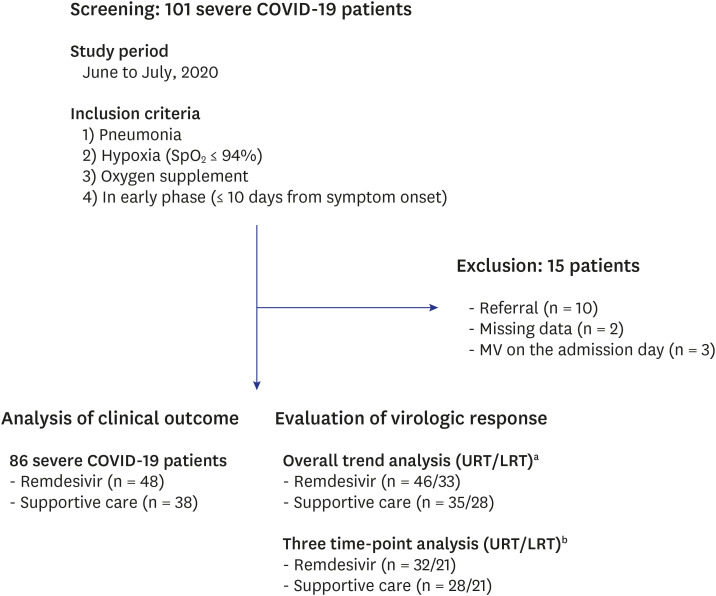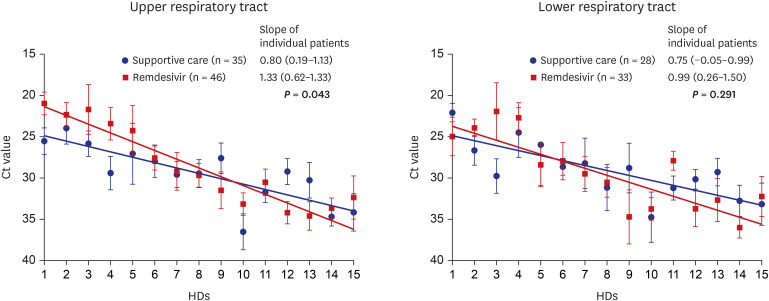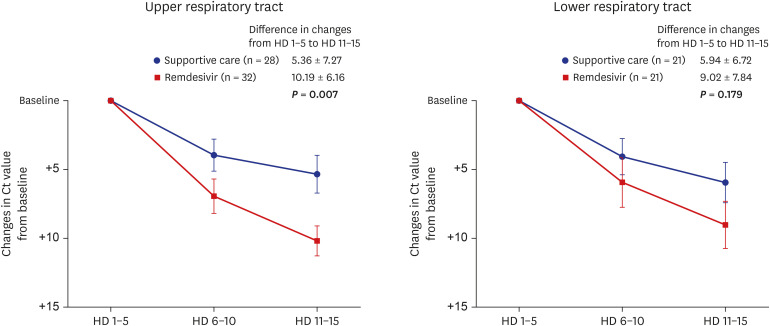J Korean Med Sci.
2021 Mar;36(11):e83. 10.3346/jkms.2021.36.e83.
Clinical and Virologic Effectiveness of Remdesivir Treatment for Severe Coronavirus Disease 2019 (COVID-19) in Korea: a Nationwide Multicenter Retrospective Cohort Study
- Affiliations
-
- 1Division of Infectious Diseases, Department of Medicine, Kangbuk Samsung Hospital, Sungkyunkwan University School of Medicine, Seoul, Korea
- 2Division of Infectious Diseases, Department of Medicine, Samsung Medical Center, Sungkyunkwan University School of Medicine, Seoul, Korea
- 3Division of Infectious Diseases, Department of Internal Medicine, Chonnam National University Hospital, Gwangju, Korea
- 4Department of Internal Medicine, Inha University School of Medicine, Incheon, Korea
- 5Division of Pulmonary and Critical Care, Department of Internal Medicine, Seoul Metropolitan Government-Seoul National University Boramae Medical Center, Seoul, Korea
- 6Division of Infectious Diseases, Department of Internal Medicine, Gil Medical Center, Gachon University College of Medicine, Incheon, Korea
- 7Department of Internal Medicine, Seoul National University College of Medicine, Seoul, Korea
- 8Department of Infectious Diseases, Asan Medical Center, University of Ulsan College of Medicine, Seoul, Korea
- 9Department of Internal Medicine, School of Medicine, Chosun University, Gwangju, Korea
- 10Department of Internal Medicine, Inje University Sanggye Paik Hospital, Seoul, Korea
- 11Department of Infectious Diseases, Myongji Hospital, Hanyang University College of Medicine, Goyang, Korea
- 12Division of Infectious Disease, Department of Medicine, Seongnam Citizens Medical Center, Seongnam, Korea
- 13Division of Infectious Diseases, Department of Internal Medicine, Chung-Ang University Hospital, ChungAng University College of Medicine, Seoul, Korea
- 14Department of Internal Medicine, School of Medicine, Kyungpook National University, Daegu, Korea
- 15Division of Infectious Diseases, Department of Internal Medicine, Chungnam National University School of Medicine, Daejeon, Korea
- 16Department of Infectious Diseases, National Health Insurance Service Ilsan Hospital, Goyang, Korea
- 17Department of Internal Medicine, Soonchunhyang University Seoul Hospital, Soonchunhyang University College of Medicine, Cheonan, Korea
- 18Department of Internal Medicine, Soonchunhyang University Cheonan Hospital, Soonchunhyang University College of Medicine, Cheonan, Korea
- 19Division of Infectious Disease, Department of Internal Medicine, Severance Hospital, Yonsei University College of Medicine, Seoul, Korea
- 20Department of Infectious Diseases, Ajou University School of Medicine, Suwon, Korea
- KMID: 2514055
- DOI: http://doi.org/10.3346/jkms.2021.36.e83
Abstract
- Background
Remdesivir is widely used for the treatment of coronavirus disease 2019 (COVID-19), but controversies regarding its efficacy still remain.
Methods
A retrospective cohort study was conducted to evaluate the effect of remdesivir on clinical and virologic outcomes of severe COVID-19 patients from June to July 2020. Primary clinical endpoints included clinical recovery, additional mechanical ventilator (MV) support, and duration of oxygen or MV support. Viral load reduction by hospital day (HD) 15 was evaluated by calculating changes in cycle threshold (Ct) values.
Results
A total of 86 severe COVID-19 patients were evaluated including 48 remdesivirtreated patients. Baseline characteristics were not significantly different between the two groups. Remdesivir was administered an average of 7.42 days from symptom onset. The proportions of clinical recovery of the remdesivir and supportive care group at HD 14 (56.3% and 39.5%) and HD 28 (87.5% and 78.9%) were not statistically different. The proportion of patients requiring MV support by HD 28 was significantly lower in the remdesivir group than in the supportive care group (22.9% vs. 44.7%, P = 0.032), and MV duration was significantly shorter in the remdesivir group (average, 1.97 vs. 5.37 days; P = 0.017). Analysis of upper respiratory tract specimens demonstrated that increases of Ct value from HD 1–5 to 11–15 were significantly greater in the remdesivir group than the supportive care group (average, 10.19 vs. 5.36; P = 0.007), and the slope of the Ct value increase was also significantly steeper in the remdesivir group (average, 5.10 vs. 2.68; P = 0.007).
Conclusion
The remdesivir group showed clinical and virologic benefit in terms of MV requirement and viral load reduction, supporting remdesivir treatment for severe COVID-19.
Keyword
Figure
Cited by 1 articles
-
Antivirals for Coexistence with COVID-19: Brief Review for General Physicians
Jin-Hong Yoo
J Korean Med Sci. 2021;36(42):e298. doi: 10.3346/jkms.2021.36.e298.
Reference
-
1. Sheahan TP, Sims AC, Graham RL, Menachery VD, Gralinski LE, Case JB, et al. Broad-spectrum antiviral GS-5734 inhibits both epidemic and zoonotic coronaviruses. Sci Transl Med. 2017; 9(396):eaal3653. PMID: 28659436.
Article2. Wang M, Cao R, Zhang L, Yang X, Liu J, Xu M, et al. Remdesivir and chloroquine effectively inhibit the recently emerged novel coronavirus (2019-nCoV) in vitro. Cell Res. 2020; 30(3):269–271. PMID: 32020029.
Article3. Wang Y, Zhang D, Du G, Du R, Zhao J, Jin Y, et al. Remdesivir in adults with severe COVID-19: a randomised, double-blind, placebo-controlled, multicentre trial. Lancet. 2020; 395(10236):1569–1578. PMID: 32423584.4. Beigel JH, Tomashek KM, Dodd LE, Mehta AK, Zingman BS, Kalil AC, et al. Remdesivir for the treatment of COVID-19 - final report. N Engl J Med. 2020; 383(19):1813–1826. PMID: 32445440.
Article5. Kalligeros M, Tashima KT, Mylona EK, Rybak N, Flanigan TP, Farmakiotis D, et al. Remdesivir use compared with supportive care in hospitalized patients with severe COVID-19: a single-center experience. Open Forum Infect Dis. 2020; 7(10):ofaa319. PMID: 33117850.
Article6. Olender SA, Perez KK, Go AS, Balani B, Price-Haywood EG, Shah NS, et al. Remdesivir for severe COVID-19 versus a cohort receiving standard of care. Clin Infect Dis. Forthcoming. 2020.
Article7. WHO Solidarity Trial Consortium. Pan H, Peto R, Henao-Restrepo AM, Preziosi MP, Sathiyamoorthy V, et al. Repurposed antiviral drugs for COVID-19 - interim WHO solidarity trial results. N Engl J Med. 2021; 384(6):497–511. PMID: 33264556.
Article8. Lee C, Ahn MY, Byeon K, Choi JP, Hahm C, Kim H, et al. Clinical experience with use of remdesivir in the treatment of severe acute respiratory syndrome coronavirus 2: a case series. Infect Chemother. 2020; 52(3):369–380. PMID: 32757500.
Article9. Yoo JH. Uncertainty about the efficacy of remdesivir on COVID-19. J Korean Med Sci. 2020; 35(23):e221. PMID: 32537956.
Article10. Sung HK, Kim JY, Heo J, Seo H, Jang YS, Kim H, et al. Clinical course and outcomes of 3,060 patients with coronavirus disease 2019 in Korea, January-May 2020. J Korean Med Sci. 2020; 35(30):e280. PMID: 32743995.
Article11. Ministry of Health and Welfare. Supplying Remdesivir for the treatment of COVID-19. Updated 2020. Accessed February 16, 2021. http://www.mohw.go.kr/react/al/sal0301vw.jsp?PAR_MENU_ID=04&MENU_ID=0403&page=1&CONT_SEQ=355233.12. Huh HJ, Hong KH, Kim TS, Song SH, Roh KH, Lee H, et al. Surveillance of coronavirus disease 2019 (COVID-19) testing in clinical laboratories in Korea. Ann Lab Med. 2021; 41(2):225–229. PMID: 33063685.
Article13. Ko JH, Lim JU, Choi JY, Oh HS, Yoo H, Jhun BW, et al. Early cidofovir administration might be associated with a lower probability of respiratory failure in treating human adenovirus pneumonia: a retrospective cohort study. Clin Microbiol Infect. 2020; 26(5):646.e9–646.e14.
Article14. Shah DP, Ghantoji SS, Shah JN, El Taoum KK, Jiang Y, Popat U, et al. Impact of aerosolized ribavirin on mortality in 280 allogeneic haematopoietic stem cell transplant recipients with respiratory syncytial virus infections. J Antimicrob Chemother. 2013; 68(8):1872–1880. PMID: 23572228.
Article15. Boikos C, Caya C, Doll MK, Kraicer-Melamed H, Dolph M, Delisle G, et al. Safety and effectiveness of neuraminidase inhibitors in situations of pandemic and/or novel/variant influenza: a systematic review of the literature, 2009-15. J Antimicrob Chemother. 2017; 72(6):1556–1573. PMID: 28204554.
Article16. Weinreich DM, Sivapalasingam S, Norton T, Ali S, Gao H, Bhore R, et al. REGN-COV2, a neutralizing antibody cocktail, in outpatients with COVID-19. N Engl J Med. 2021; 384(3):238–251. PMID: 33332778.
Article17. Chen P, Nirula A, Heller B, Gottlieb RL, Boscia J, Morris J, et al. SARS-CoV-2 neutralizing antibody LY-CoV555 in outpatients with COVID-19. N Engl J Med. 2021; 384(3):229–237. PMID: 33113295.
Article18. Williamson BN, Feldmann F, Schwarz B, Meade-White K, Porter DP, Schulz J, et al. Clinical benefit of remdesivir in rhesus macaques infected with SARS-CoV-2. Nature. 2020; 585(7824):273–276. PMID: 32516797.
Article19. Kim SB, Huh K, Heo JY, Joo EJ, Kim YJ, Choi WS, et al. Interim guidelines on antiviral therapy for COVID-19. Infect Chemother. 2020; 52(2):281–304. PMID: 32342676.
Article20. Kim JW, Kim EJ, Kwon HH, Jung CY, Kim KC, Choe JY, et al. Lopinavir-ritonavir versus hydroxychloroquine for viral clearance and clinical improvement in patients with mild to moderate coronavirus disease 2019. Korean J Intern Med. 2021; 36(Suppl 1):S253–S263. PMID: 32536150.
Article21. RECOVERY Collaborative Group. Horby P, Mafham M, Linsell L, Bell JL, Staplin N, et al. Effect of hydroxychloroquine in hospitalized patients with COVID-19. N Engl J Med. 2020; 383(21):2030–2040. PMID: 33031652.
Article22. Geleris J, Sun Y, Platt J, Zucker J, Baldwin M, Hripcsak G, et al. Observational study of hydroxychloroquine in hospitalized patients with COVID-19. N Engl J Med. 2020; 382(25):2411–2418. PMID: 32379955.
Article23. Cao B, Wang Y, Wen D, Liu W, Wang J, Fan G, et al. A trial of lopinavir-ritonavir in adults hospitalized with severe COVID-19. N Engl J Med. 2020; 382(19):1787–1799. PMID: 32187464.24. Libster R, Pérez Marc G, Wappner D, Coviello S, Bianchi A, Braem V, et al. Early high-titer plasma therapy to prevent severe COVID-19 in older adults. N Engl J Med. 2021; 384(7):610–618. PMID: 33406353.
Article25. Joyner MJ, Carter RE, Senefeld JW, Klassen SA, Mills JR, Johnson PW, et al. Convalescent plasma antibody levels and the risk of death from COVID-19. N Engl J Med. Forthcoming. 2021.26. Simonovich VA, Burgos Pratx LD, Scibona P, Beruto MV, Vallone MG, Vázquez C, et al. A randomized trial of convalescent plasma in COVID-19 severe pneumonia. N Engl J Med. 2021; 384(7):619–629. PMID: 33232588.
Article27. Hung IF, Lung KC, Tso EY, Liu R, Chung TW, Chu MY, et al. Triple combination of interferon beta-1b, lopinavir-ritonavir, and ribavirin in the treatment of patients admitted to hospital with COVID-19: an open-label, randomised, phase 2 trial. Lancet. 2020; 395(10238):1695–1704. PMID: 32401715.28. Hoang T, Anh TT. Treatment options for severe acute respiratory syndrome, middle east respiratory syndrome, and coronavirus disease 2019: a review of clinical evidence. Infect Chemother. 2020; 52(3):317–334. PMID: 32869558.
Article
- Full Text Links
- Actions
-
Cited
- CITED
-
- Close
- Share
- Similar articles
-
- A Case Report for Severe COVID-19 in a 9-Year-Old Child Treated with Remdesivir and Dexamethasone
- Vaccines and Treatment of Coronavirus Disease 2019
- Clinical outcomes of remdesivir-treated COVID-19 patients in South Korea
- COVID-19 infection and severe clinical outcomes in patients with kidney disease by vaccination status: a nationwide cohort study in Korea
- How We Have Treated Severe to Critically Ill Patients With Coronavirus Disease 2019 in Korea




